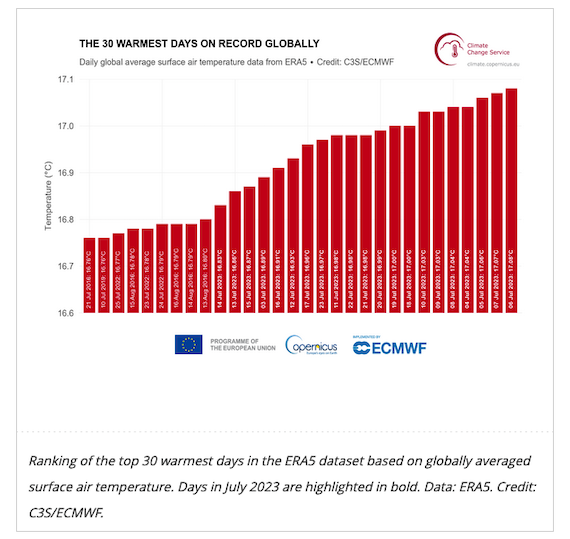Ann Arbor (Informed Comment) – The World Meteorological Association said this weekend as July comes to a close that it will have been the hottest month in recorded history. Its first three weeks were certainly the hottest on record. It likely will have been the hottest month in 120,000 years. Modern homo sapiens as a species is thought to have begun about 150,000 years ago.
The WMO quotes United Nations Secretary-General António Guterres, who pointed out that already in July we have seen the three hottest days on record, and the highest ocean temperatures ever recorded for this time of year.
The extreme heat is caused by human beings burning coal, fossil gas and gasoline, on top of which we have an El Nino phenomenon this year. Although some of the extremes we are seeing may not be as bad next year when the El Nino declines, the underlying heating of the planet will continue to intensify rapidly as long as we massively pollute the atmosphere with carbon dioxide and methane.
The extreme heat has contributed to nearly 1,000 active forest fires in Canada, about 600 of which are considered to be out of control. Four times more acreage is on fire this year than is usual, consuming 3 percent of Canada’s territory.
Likewise, Greece experienced a heat wave made 50 times more likely by human-caused climate change, which in turn led to the outbreak of wildfires on the island of Rhodes, necessitating the evacuation of 17,000 tourists as the fires marched toward tourist hotels. Fires also broke out near the capital, Athens. Humans’ heat-trapping gases have raised the average temperature of the earth 1.2 degrees C. since the Industrial Revolution, raising the chances of such catastrophes astronomically.
MSNBC: “We are in an ‘era of global boiling’ as nearly half of all Americans are under heat advisories”

On July 6, the mean surface temperature of the earth reached 17.08°C) (62.744°F).
Every single day in July after the 3rd has been hotter than the previous record set on August 13, 2016, of 16.80°C (62.24°F). WMO provides this chart:
Figure S1. Ranking of the top 30 warmest days in the ERA5 dataset based on globally averaged surface air temperature.

The first puny 9 little tabs are from 2016 and 2022, previous heat record-setters. All the rest are from this July, and since they only go up to the 23rd it is likely that when the chart is updated early next week, July 2023 will have crowded out all the other dates.
The mean temperature of the ocean surface has also rivaled the hottest temperature ever recorded for much of the month. Some of the heat in the Atlantic comes from fewer particles blowing over it from the Sahara than usual, and since the wind-borne sand and dust reflect sunlight, they usually cool the ocean a bit. In their absence, and given the El Nino effect from the South Pacific, temperatures have been high.
The water off Key Largo, Florida, hit 101.19 °F. last Monday, a record-breaker and just about the recommended temperature for a hot tub. Coral reefs, which play an important role in the undersea ecology, affording shelter to fish from predators and places to lay eggs, have been bleaching out, indicating that they are dying from the heat. Some have just dropped dead all of a sudden, rather than bleaching and then slowly dying.
If you prefer dry heat, Phoenix, AZ, has had thirty straight days of temperatures over 110 degrees F. This run breaks a record from 1974. Saturday saw the 6th day in a row with highs of at least 115 degrees F.
The dangers of this kind of heat, which will become more and more common in coming years, include heat stroke, which will kill ever more people.
Scientists have discovered that if we cease spewing carbon pollution, the rise in temperatures will cease immediately. In order to avoid a chaotic climate, we must reach zero carbon by 2050. We only have 27 years to completely redo the world’s electricity production and delivery systems, completely redo transportation, and completely redo urban building and rural agriculture. At least now more people understand the dangers of global boiling, though we need real urgency to make our politicians act. Only governments can respond to this crisis at the necessary scale. Still, we individuals can contribute, as Australians have shown by putting up solar panels on their roofs. And GM has just announced that it will keep the Bolt, the most affordable EV in the US market, in production.



 © 2025 All Rights Reserved
© 2025 All Rights Reserved